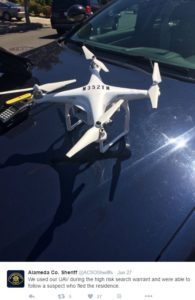
California
In California, the Alameda County Sheriff’s Office recently added four more drones to its fleet – bringing the total to six following its first purchase in 2014.
The ACSO drones have already proven valuable. Last month, the drones helped locate and arrest a fleeing suspect connected to an illegal casino.
“In this situation the suspect fled, and the UAV was able to observe the suspect flee and to alert the first responders to where he was so they could contain him and apprehend him as safely as possible,” said Capt. Tom Madigan in an interview with Ars Technica.
Ars notes that the ACSO has flown 35 missions since 2014 including backup sorties following two police shootings, an active shooter at a local military base and a search-and-rescue mission in San Francisco.
For officials in Barstow, Calif., skyrockets in flight are not an afternoon or evening delight and one city councilman thinks drones may be the way to stop illegal fireworks.
According to the Desert Dispatch, Councilman Richard Harpole wants the local police department to deputize a drone to curtail the “outrageous” incidents of illicit roman candles, bottle rockets and other fireworks launched during the July 4th holiday.
“The use of drones would be a way to quickly zero in on neighborhoods and houses where these illegal fireworks are being used and maybe we can be a bit more effective and we can put stop to this,” Harpole said, adding that “this year has been the absolute worst.”
North Carolina
In Lenoir County, N.C., the local sheriff and police departments, as well EMS and firefighting agencies plan to buy a drone if they can obtain a joint FAA request.
According to WNCT, the drone costs $18,000 and will be funded through asset forfeiture money and a few grants.
“We can use a drone to … do aerial surveillance without sending an officer in the line of fire, so to speak, or in harm’s way,” EMS Planner Samuel Kornegay told WNCT.
As earlier reported in DroneLife, the county’s community college will offer a drone-piloting program and the Lenoir County agencies plan to take advantage of it to receive federally-mandated training. Lenoir Community College unveiled the drone program earlier this month. It will grant students an associate’s degree in drone piloting – the first ever in the state.
Source link